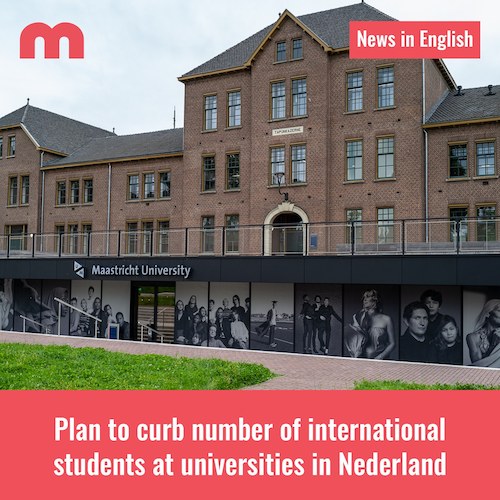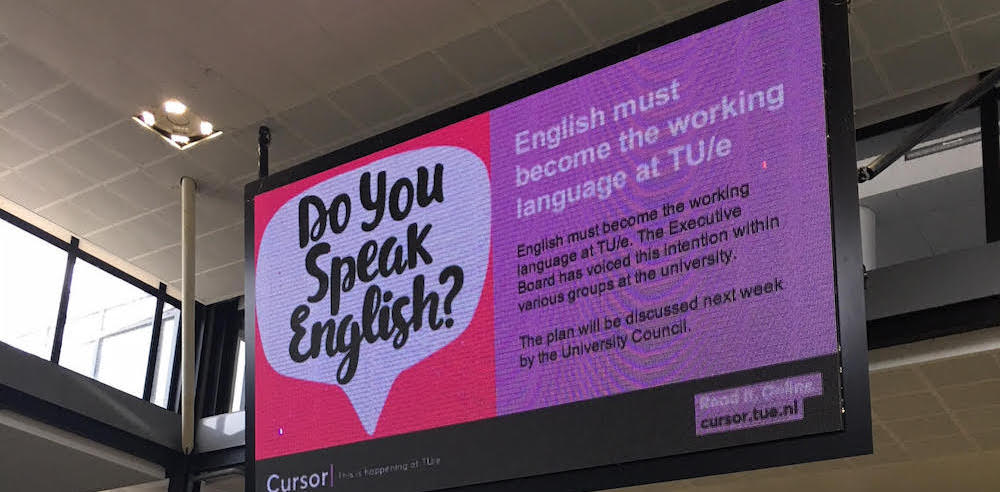(Editor’s note: This opinion post about the Netherlands limiting international students is part of our Tech Tuesdays series. Dispatches covers tech because so many highly skilled internationals are engineers and physicists. Dispatches is dedicated to the global mobility of talent.)

My daughter Lale got both her undergraduate degree and her Master’s degree at Maastricht University. As non-European Union citizens, we spent at least 80,000 euros on tuition. That doesn’t count all the money Lale spent on rent, food and expenses. In the deal, she got a superior education while spending far less than she would have at an Ivy, the University of Virginia, Duke or one of the better public or private American universities in the South where we’re from.
The Dutch got a student who essentially underwrote the tuitions of three Dutch students as well as a tax-paying employee who now works at the Netherlands’ major R&D campus.
Lale, like all her international friends from Italy, German and wherever, contribute to the Dutch economy in so many ways.
But that’s not good enough.
‘Collectively curbing enrollment’
Lale just got a notice on Instagram that “Universiteit Maastricht (UM) is cooperating in a plan whereby all universities in Nederland are to collectively curb the enrolment (SIC) of new international students. The educational institutions see the increase in international students causing bottlenecks and friction in society.”
“Friction in society” is code for, “these students go around Dutch university towns speaking English.” Which is true. When we go to Maastricht, Amsterdam or even into Eindhoven where Dispatches is based, English is just as common as Dutch. In stores and restaurants, fewer and fewer servers and clerks speak Dutch because they’re coming from Turkey, Lithuania or wherever, filling in the chronic Dutch labor shortages.
The truth is, there’s no compelling reason to learn Dutch, a tertiary language that maybe 20 million people speak, as opposed to English, which is spoken by 2 billion people worldwide.
Some of this new drift toward cultural insularity ties into the recent victory of far-right extremist Geert Wilders in last November’s national elections. Wilders is famous for wanting to deport Muslims and block entry even to other EU citizens. Which would be a step toward leaving the trade union. What shocks us is, the higher education association Universiteiten van Nederland is leading the charge to discourage international students with a policy of cutting the number of classes in English and adding classes in Dutch.
Bad policy, bad timing
What is truly mind blowing is this is happening at a time when Dutch semiconductor companies literally rule the world and can’t find enough tech talent. ASML supplies the global semiconductor industry with the photolithography tools – the most complicated machines in the world – essential to making advanced computer chips. Peter Wennink, CEO of Eindhoven-based ASML, has warned repeatedly that walling off the Netherlands will lead to economic disaster.
Wennink’s position on knowledge migrants is clear: they are indispensable to the Dutch economy. He notes that they contribute to the economy and pay taxes. This view is supported by ASML, the largest technology company in Europe, with employees from as many as 124 nationalities. Many come from India, Turkey, Belgium, and Portugal.
Or as Freem041 commented on the Maastricht University Instagram post: “I’m new to the area (target audience for this measure I assume) and own recruiting for one of the world’s largest tech companies. From the standpoint of a corporate recruiter, this is BAFFLING. Not to mention the lack of inclusivity in an already homogenous area.”
The “societal friction” Newspeak in the release also alludes to housing shortages, which are, in part, caused by an influx of internationals working and studying in the Netherlands, who now number more than 120,000. But that’s hardly students’ fault. That’s on Dutch policymakers in Amsterdam and across the country who, when it comes to housing, are slow to act and constrained by regulation.
Trjacobin commented on the UM Instagram post: “Cause: Housing problem, symptom: internationals in the NL. You know it’s good policy when it addresses solving the symptom. 😂”
The Dutch “solution” is a new slash-and-burn policy, a freeze on new English-language bachelor programs. And the Instagram notice from the Maastricht University states that the preparatory year for international students, called the “foundation program” at UM, will also be discontinued.
Nice.
Blocking internationals so we can be more international
That university notice closes with Orwellian logic:
“Despite the measures, UM does emphasise (SIC) that it is an international university and that it is precisely this profile that is much needed in this border region.”
Wait, what? We’re an international university that’s disinviting anyone who doesn’t speak Dutch?
Maastricht sits on the border with Germany, and benefits from German students, who, for the record, come to study in English. It’s also on the border with Belgium and benefits from Belgian students, many of whom don’t speak Dutch but do speak English.
Fortunately for us, Eindhoven appears to be exempt from the madness. Robert-Jan Smits, president of the executive board at Technical University of Eindhoven, has gone on the record as saying he will fight for international students. Smits notes in the Dutch News that Denmark tried limiting international students for two years, then reversed course in 2023.
I have to wonder if the Netherlands’ close proximity to the United Kingdom means it’s contracted the Brexit virus, a desire to “take back control” at the expense of citizens’ quality of life? Britain constructed a political trap from which it can’t escape.
The Netherlands still has time to come to its senses.
Co-CEO of Dispatches Europe. A former military reporter, I'm a serial expat who has lived in France, Turkey, Germany and the Netherlands.















